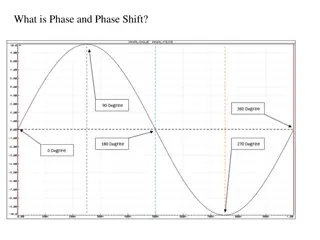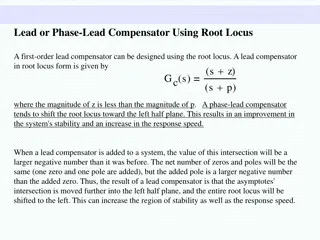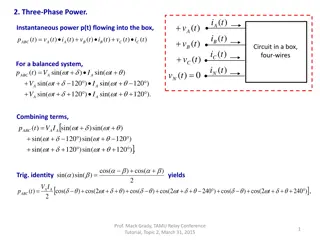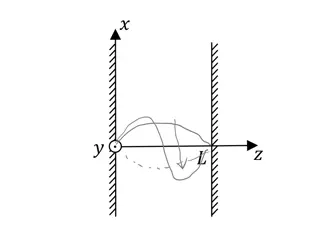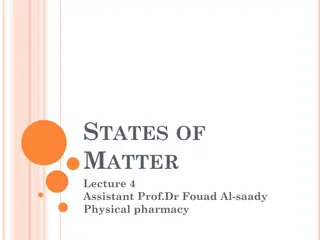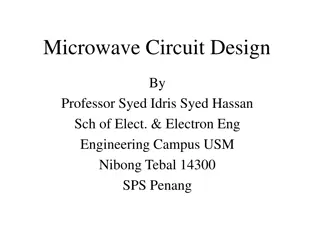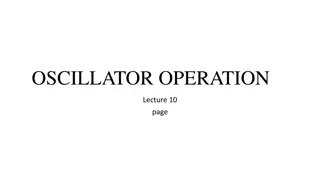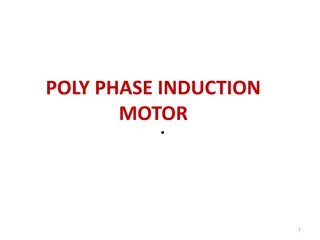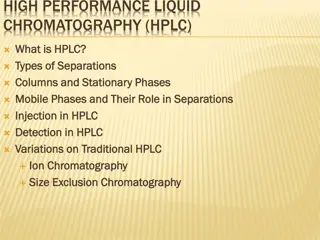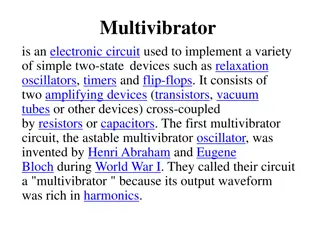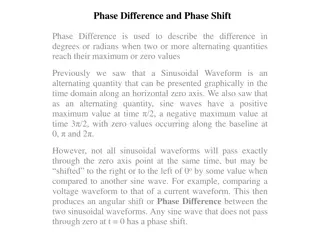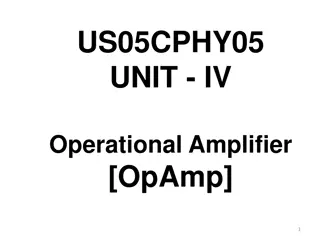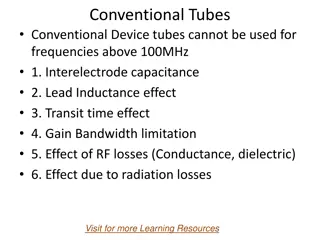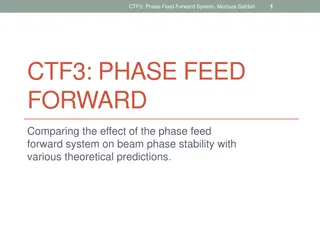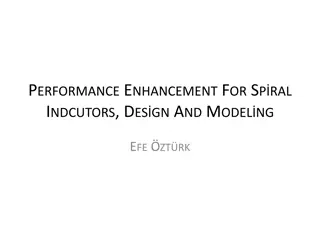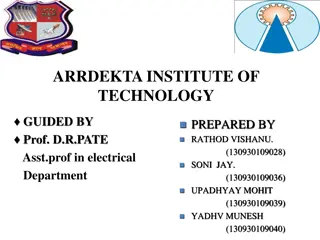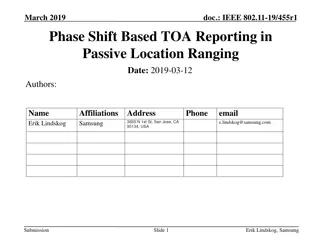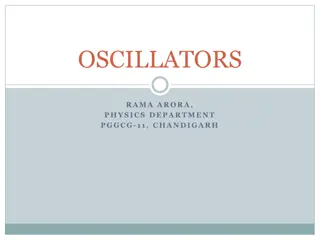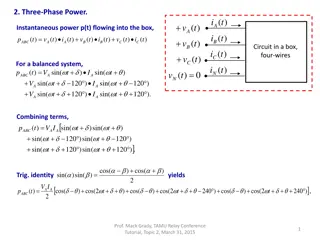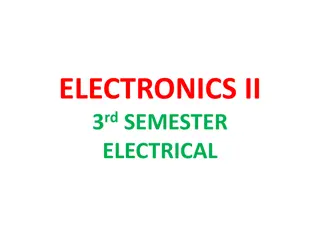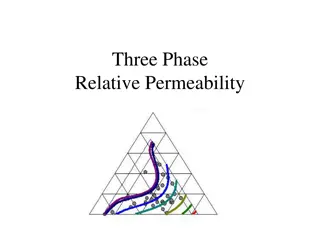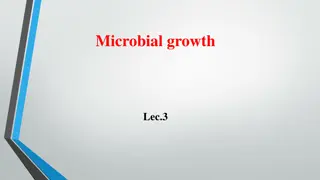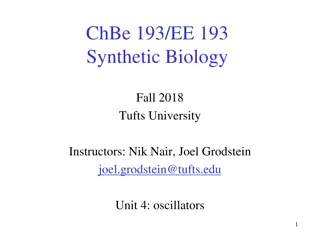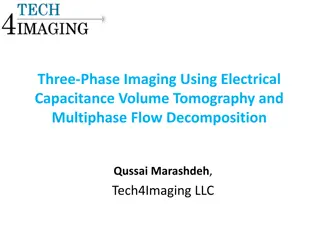Understanding RC Phase Shift Oscillators
Dive into the world of RC phase shift oscillators, exploring the concepts of phase and phase shift in electronic circuits. Learn how cascading RC networks can achieve specific phase shifts, the role of impedance, and the practical applications of RC feedback networks in oscillator circuits. Discover
1 views • 18 slides
Understanding Lead and Phase-Lead Compensators
Lead and Phase-Lead compensators play a crucial role in improving system stability and response speed. By using the root locus and frequency response methods, these compensators shift the root locus toward the left half-plane, adding positive phase over the frequency range. This leads to increased s
0 views • 16 slides
Understanding the Three Stages of Project Life Cycle
The project life cycle consists of three key stages: pre-investment phase, construction phase, and normalisation phase. The pre-investment phase involves objective formulation, demand forecasting, and cost-benefit analysis. The construction phase focuses on building project infrastructure and invest
1 views • 5 slides
Understanding Three-Phase Power Systems and Instantaneous Power Flow
This detailed content delves into three-phase power systems, analyzing instantaneous power flow, balanced circuits, and trigonometric calculations. It explores the concept of constant three-phase power and provides insights into the analogy of a piston engine with infinite cylinders. The data includ
2 views • 9 slides
Shift of the Church: Eastward Expansion Through History
The Asian Church is witnessing a significant shift in influence from the West to the Majority World, marking a transformative phase in modern mission movements. With historical milestones like the Roman Catholic presence established in 1493 and the Protestant movement beginning in 1705 through figur
0 views • 12 slides
Understanding Quantum Aspects of Electromagnetic Oscillations
Exploring the quantum nature of electromagnetic oscillations through concepts such as wave-particle duality, quantum harmonic oscillators, photon-number states, coherent light, and squeezed light. Delve into non-classical states, vacuum states, potential wells, and more in the fascinating world of q
1 views • 15 slides
Understanding Phase Equilibria in Physical Pharmacy
Delve into the complexities of states of matter, phase equilibria, and the phase rule as explained by Assistant Prof. Dr. Fouad Al-saady in the context of physical pharmacy. Learn about phase definitions, phases in different systems, and examples illustrating phase differentiation in various substan
0 views • 22 slides
Comprehensive Microwave Circuit Design Course Overview
This comprehensive course on Microwave Circuit Design by Professor Syed Idris Syed Hassan covers topics such as transmission lines, network parameters, matching techniques, power dividers, diode circuits, amplifiers, oscillators, filters design, and more. The syllabus includes lectures, simulations,
0 views • 49 slides
Phase 1 Phonics: Developing Early Listening and Speaking Skills
Phase 1 Phonics, the initial stage of Letters and Sounds, focuses on enhancing children's speaking and listening abilities to prepare them for phonics work in Phase 2. This phase emphasizes tuning in to sounds, listening and remembering sounds, and talking about sounds through various activities des
3 views • 17 slides
Understanding Oscillator Operation and Phase-Shift Oscillators
The use of positive feedback in a feedback amplifier with closed-loop gain greater than 1 can lead to oscillation, resulting in a varying output signal. Different types of oscillators, such as sinusoidal and pulse oscillators, are discussed along with the Barkhausen criterion for oscillation. The co
1 views • 23 slides
Understanding Waveform Generators in Electronic Circuits
Waveform generators, such as square wave oscillators and triangular wave generators, play crucial roles in electronic circuits. Square wave oscillators use capacitors and op-amps to create square wave outputs through charging and discharging processes. On the other hand, triangular wave generators u
1 views • 11 slides
Understanding Poly Phase Induction Motor Construction
An induction motor is comprised of a stator and rotor, with the stator featuring a 3-phase winding fed from a 3-phase supply. The rotor comes in two types - squirrel-cage and phase wound. The squirrel-cage rotor consists of heavy bars tightly pressed on the shaft, while the phase wound rotor has a 3
0 views • 47 slides
An Overview of High Performance Liquid Chromatography (HPLC)
High Performance Liquid Chromatography (HPLC) is a powerful analytical technique used for separating and identifying compounds in a mixture. It involves a mobile phase and a stationary phase to achieve separation based on different physicochemical properties. The mobile phase plays a crucial role in
0 views • 20 slides
Benefits of Vocantas Mobile App and Online Portal
Explore the benefits of using the Vocantas Mobile App and Online Portal, including easy installation on mobile devices, managing notifications, shift filtering, bidding on future shifts, receiving notifications on shift awards, adding shifts to your calendar, and more. The Online Portal offers featu
0 views • 9 slides
Understanding Signal Generators and Oscillators in Electrical Testing
Signal generators and oscillators are essential sources of electrical signals for testing various equipment. Fixed and variable AF oscillators play a key role in generating different waveforms. Fixed frequency oscillators provide signals within specified ranges, while variable oscillators cover the
3 views • 17 slides
Overview of Multivibrators: Types and Applications
Multivibrators are electronic circuits used for various applications such as oscillators, timers, and flip-flops. They consist of two amplifying devices cross-coupled by resistors or capacitors. The three main types are astable, monostable, and bistable multivibrators, each serving different purpose
0 views • 10 slides
Understanding the Phase Rule in Physical Pharmacy: Two Component Systems and Equilibrium Phases
The Phase Rule is essential in determining the state of a system based on components and phases. This study explores two-component systems in physical pharmacy, illustrating miscibility behaviors and equilibrium phases through diagrams and explanations. Understanding binodal curves, tie lines, and t
0 views • 12 slides
Understanding Phase Difference and Phase Shift in Sinusoidal Waveforms
Phase difference and phase shift describe the angular displacement of sinusoidal waveforms in degrees or radians. These concepts are crucial in analyzing the relationship between alternating quantities such as voltage and current. The phase angle determines the shift of a waveform along the horizont
1 views • 26 slides
Understanding Shift Registers in Sequential Logic Circuits
Shift registers are sequential logic circuits used for storing digital data. They consist of interconnected flip-flops that shift data in a controlled manner. This article explores different types of shift registers such as Serial In - Serial Out, Serial In - Parallel Out, Parallel In - Serial Out,
2 views • 9 slides
Discussion on UL 7.5kHz Frequency Shift for n34 and n39 in 3GPP TSG-RAN WG4 Meeting #100-e
The approval document for Working Group on Dual-Site Selection (DSS) for n34 and n39 in CMCC, discussed in the 3GPP TSG-RAN WG4 Meeting #100-e, addresses the UL 7.5kHz shift agreements for different releases. The document outlines the mandatory nature of the shift for n34 and n39 in later releases,
3 views • 4 slides
Training Phase in Teen Challenge Residential Program
The training phase in the Teen Challenge residential program is a crucial period focused on developing drug-free lifestyles, deepening relationships with Jesus, and creating personal recovery and exit plans. Participants follow a structured daily schedule that includes devotions, classes, work progr
0 views • 12 slides
Understanding Operational Amplifiers (Op-Amps) and Their Applications
Operational Amplifiers (Op-Amps) are devices used to amplify signals using an external power source. They are composed of transistors, resistors, and capacitors. Op-Amps find applications in summing amplifiers, AC and DC signal processing, digital-to-analog converters, active filters, oscillators, r
1 views • 41 slides
Understanding Microwave Tubes and Klystron Technology
Microwave tubes play a crucial role in high-frequency applications due to their efficiency and operating principles. Conventional tubes face limitations beyond 100MHz, while efficient microwave tubes utilize electron velocity modulation for power conversion. Klystron tubes, such as Reflex Klystron,
4 views • 19 slides
Overview of DARE22 Test Vehicle Design on FD SOI 22nm Process
This detailed presentation explores the test structures and components inside the TV, including combinatorial logic, sequential logic, clock gating, ring oscillators, input-output cells, analog IPs, and more. It covers various test scenarios such as irradiation testing, SET/SEU measurements, functio
1 views • 32 slides
Phase Feed Forward System: Analyzing Beam Phase Stability and Theoretical Predictions
Exploring the impact of phase feed forward systems on beam phase stability through comparisons with theoretical predictions and simulations of increasing limitations. Testing the accuracy of theoretical gain factors and assessing performance using global gain factors. Utilizing specific data files a
0 views • 58 slides
Enhancing Spiral Inductors: Design, Modeling, and Performance Optimization
Understanding the importance of inductor parameters like inductance value, self-resonance frequency, and quality factor, this content explores loss mechanisms in inductors and ways to improve their quality. It delves into topics such as reducing phase noise in oscillators, minimizing insertion loss
0 views • 17 slides
Understanding Three Phase Transformers and Connections in Power Systems
Exploring the fundamentals of three-phase transformers and their connections in power systems, such as star-star, delta-delta, star-delta, and delta-star. Learn about advantages, disadvantages, and applications of these configurations in balanced and unbalanced loads. Discover how three single-phase
0 views • 19 slides
Passive Location Ranging Using Phase Shift Based TOA Reporting
This document discusses the implementation of phase shift based time-of-arrival (TOA) reporting in passive location ranging within the IEEE 802.11 standard. The proposal suggests enabling this feature for passive ranging alongside existing active ranging methods, aiming to enhance accuracy and relia
0 views • 24 slides
IEEE 802.11-19/0709r0 - Immediate and Delayed Feedback May 2019
The document discusses immediate and delayed feedback mechanisms in IEEE 802.11-19/0709r0, focusing on parameters, feedback types, and ranging options. It explores variations in feedback direction and types, proposing options for phase shift feedback and distinguishing between RSTA-to-ISTA and ISTA-
0 views • 6 slides
Understanding Oscillators: Basics and Operations
Oscillators are vital electronic devices that convert DC power to AC power without external input. They consist of components like the tank circuit, transistor amplifier, and feedback circuit. Learn about the classification, fundamental principles, feedback oscillators, and tuned collector oscillato
0 views • 24 slides
Understanding Nutritional Treatment Phases in Pediatric Malnutrition
This session covers the different phases of nutritional treatment in pediatric malnutrition programs, focusing on objectives, specifics, and criteria for transitioning between phases. An illustrative case of Annika, a 3-year-old in the Transition Phase, is provided for practical application and unde
0 views • 5 slides
Understanding Three-Phase Power Systems
This content discusses three-phase power systems, including instantaneous power flow, balanced systems, and trigonometric identities. It delves into the concept of smooth running machines in relation to three-phase power, analyzing the constant nature of instantaneous power. The analogies to a pisto
0 views • 7 slides
Understanding Oscillators in Electronics
Explore the world of oscillators in electronics, including the operation of transistors in class-B and class-C amplifiers, the significance of achieving maximum swing, the theoretical efficiency of different amplifier classes, and the role of oscillators as signal generators in electronic circuits.
0 views • 20 slides
Understanding Three-Phase Relative Permeabilities in Reservoir Engineering
Explore the application, correlations, and traditional assumptions of three-phase relative permeabilities in reservoir engineering. Learn about saturation-dependencies, occupancy models, and the challenges of measuring three-phase relative permeabilities. Discover how to calculate three-phase permea
0 views • 14 slides
Understanding Microbial Growth: Phases and Dynamics
Microbial growth is defined as an increase in cellular constituents leading to a rise in microorganism size or population. The growth of bacterial cells is characterized by distinct phases such as lag phase and exponential phase. During the lag phase, cells are synthesizing new components before div
0 views • 21 slides
Understanding Bacterial Growth and Nutritional Requirements
Bacterial growth involves processes like binary fission, exponential phase, and stationary phase. Factors influencing growth include nutrient availability, oxygen levels, and toxic waste accumulation. Lag phase precedes exponential growth, where cells prepare for division. Stationary phase occurs wh
0 views • 11 slides
Understanding Oscillators in Synthetic Biology at Tufts University
Explore the concept of oscillators and their significance in synthetic biology through a series of lectures by instructors Nik Nair and Joel Grodstein at Tufts University. Discover the applications of oscillators in biology, such as controlling heartbeats and circadian rhythms, and learn how to buil
0 views • 28 slides
Phase II Trial Design in Oncology Drug Development by Wendy R. Parulekar, MD, FRCP
This presentation covers the pivotal role of Phase II trials in oncology drug development, emphasizing the importance of preliminary clinical efficacy screening, adverse event profiling, mechanism of action understanding, and target population definition. It discusses various Phase II trial designs,
0 views • 76 slides
Advanced Imaging Techniques for Three-Phase Flows in Reactor Systems
Gas-liquid-solid reactor systems require advanced measuring techniques to understand complex three-phase flows. Multi-Phase Flow Decomposition using Electrical Capacitance Volume Tomography (ECVT) offers innovative solutions for visualizing and quantifying phase hold-up distributions and dynamic cha
0 views • 17 slides
Moving to the Design Phase: Feasibility Phase Checklist
The transition requirements for moving to the Design Phase include the Water Fund being deemed feasible, resources committed for design, and a formal decision made. The Feasibility Phase Checklist covers governance, science, finance, implementation, and communications aspects. The high-level action
0 views • 4 slides
